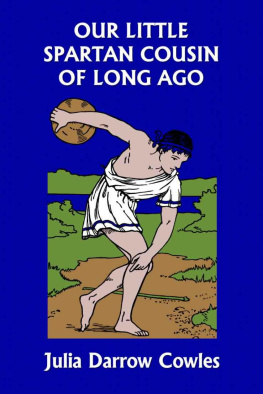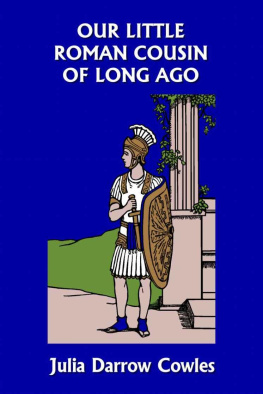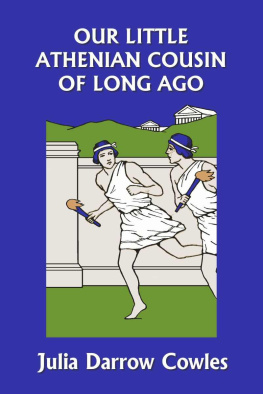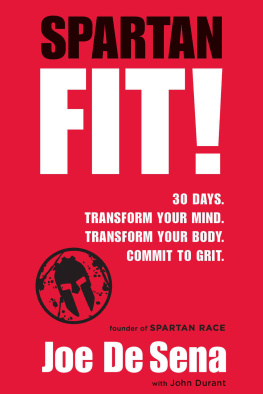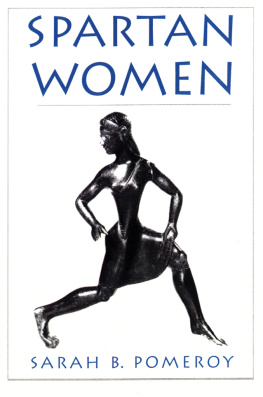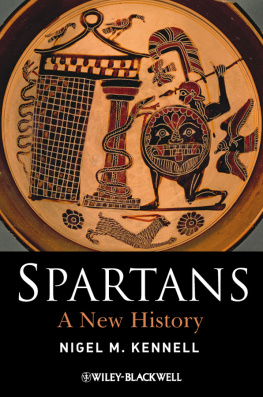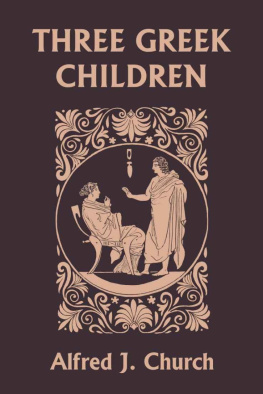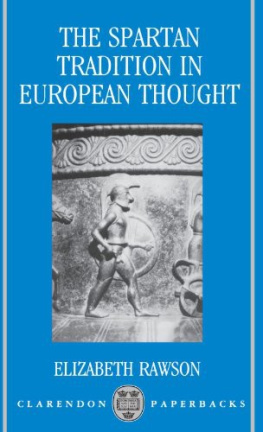Our Little Spartan Cousin of Long Ago
by
Julia Darrow Cowles
Yesterday's Classics
Chapel Hill, North Carolina
Cover and Arrangement 2010 Yesterday's Classics, LLC
All rights reserved. No part of this book may be reproduced or retransmitted in any form or by any means without the written permission of the publisher.
This edition, first published in 2010 by Yesterday's Classics, an imprint of Yesterday's Classics, LLC, is an unabridged republication of the work originally published by L. C. Page and Company in 1914. This title is available in a print edition (ISBN 978-1-59915-284-4).
Yesterday's Classics, LLC
PO Box 3418
Chapel Hill, NC 27515
Yesterday's Classics
Yesterday's Classics republishes classic books for children from the golden age of children's literature, the era from 1880 to 1920. Many of our titles are offered in high-quality paperback editions, with text cast in modern easy-to-read type for today's readers. The illustrations from the original volumes are included except in those few cases where the quality of the original images is too low to make their reproduction feasible. Unless specified otherwise, color illustrations in the original volumes are rendered in black and white in our print editions.
Preface
It has not been the intention of the author to confine the scenes of this story to a given date, but rather to select events which are typical of the Spartan life and character, and so to present a composite picture which is truly representative of a people unique in the history of mankind.
The story closes during the stirring times of the Persian invasion, but even here the author claims some of the license of the story-teller, though with no contradiction of fact, nor use of the imagination not fully warranted by Spartan history.
One of the objects sought has been to show the true nobility and rugged simplicity of the Spartan character, for it is scarcely credible that the citizens of the State which for so long a time was the acknowledged leader of all Hellas, could have been so wholly rude and savage as they are sometimes depicted.
Acknowledgment is hereby made of the author's indebtedness to "Miller's Dorians" for the invaluable aid which Professor Miller's comprehensive treatment has afforded.
Contents
CHAPTER I
A Spartan Company
"A R ACE! a race! Who will plunge first into Eurotas?"
The boy who shouted the challenge stood poised, ready for flight. His head was thrown back, his arms were extended, and one foot, thrust before him, touched the ground lightly.
It was Chartas who called, and at the sound of his voice the whole group of boys, fifteen in number, threw themselves into the same attitude, and, at a word, sped away to the banks of the river. Reaching there, they hastily threw off the one garment which each wore, and plunged into the stream.
"Chartas won!" they cried, as the challenger, whose lithe limbs gave him an advantage in running, splashed first into the water.
"He always wins in running," said Brasidas, "but wait till we wrestle. His speed will not count for so much then."
The splashing water almost drowned Brasidas' words, for the fifteen boys were swimming, ducking, plunging, and frolicking like a school of young porpoises.
However, Chartas had heard. "Yes," he answered, "I like to show my back in a race. 'Twould be different if 'twere a battle."
"How about your back now?" asked a mischievous boy named Gelon. As he spoke he dived quickly, caught Chartas by the ankles, and tripped him, face forward, into the water.
Chartas quickly recovered himself, dashed after Gelon, and a lively tussle followed. The water flew in all directions, and the other boys, quickly taking sides, began throwing water upon the two wrestlers, dashing it into the face of the one they hoped to see defeated.
The boys were well matched, but the river bottom was slippery, and as Gelon gave a turn to his antagonist's arms his foot slipped and he went down.
"Chartas wins! Chartas wins!" again shouted the boys, as Gelon came up sputtering, and shaking the water from his hair and eyes.
Gelon was not conquered, however, and he dashed once more upon Chartas. But at that moment, above the splashing of the water, and the shouting of the boys, a voice rang out from the river bank. "Back to the gymnasium; 'tis time for your drill!"
The voice was that of their iren, or captain,a boy himself but little past twenty years, whose name was Orestes.
Instantly the wrestling stopped, and the boys turned. Not a hand went back for a final splash, for these were Spartan boys, and the first lesson they had learned was to obey .
In a moment they had slipped into their chitons, and were hurrying toward the gymnasium.
As they started, Orestes threw his arm across the shoulders of Chartas, and the two followed a little more slowly.
"To-morrow the Assembly meets," said Orestes, "and I shall send you boys foraging. See how well you can acquit yourself, for I want to be proud of you."
"I wish I were old enough to attend the Assembly," said Chartas, "but I know you will tell me what takes place. I should like to listen to the speeches,but then," he added, "it is rare sport to forage, and I shall do my best."
"I know you will," said Orestes, looking with genuine pride and affection at the younger boy.
When they reached the gymnasium the others were already selecting their quoits for throwing. They paid no heed to the open preference of their captain for Chartas, since every captain of boys in Sparta had his favorite pupil. The captain's favorite was given special training and special teaching; but he was not saved from hardships or dangers. If he had been, he would, himself, have hated it, and his companions would have held him in contempt. Instead, he was given harder tasks, and was thrown into greater dangers in order that he might gain courage and endurance, and be able to prove himself keen and unafraid. For these were the qualities which made the Spartans the most heroic men of all Greece.
"Now to your places," said Orestes, and, in a moment, the boys were ready for their exercises. There was no donning of gymnasium suits. The chiton was their one garment, worn on all occasions. It was a sleeveless shirt of wool.
Then began the exercise of quoit-throwing, in which each boy sought to send his quoit or discus with the best aim and to the greatest distance.
As one of the boys, named Theognis, took up his quoit, one of the smaller boys darted out of his place.
"Stand back!" shouted Theognis. "Do you want to play the part of Hyacinthus and be struck down?"
The boy retreated, and Theognis threw his quoit.
"Bravo!" cried the boys, for the discus had sped far beyond that of any other thrower.
Theognis threw back his head, as he stood erect. He was shorter than most of his company. He could never win in a race, and in wrestling he was often thrown; but his discus-throwing was always good, and he was glad to have won this "bravo" from the boys.
As the quoits were put away, Orestes turned suddenly to Theognis and said: "You referred a moment ago to Apollo and Hyacinthus. Tell us the story."
Theognis did not hesitate: "Hyacinthus was loved by the god Apollo, and they were often together. One day as they were playing at a game of quoits, Apollo threw his discus. It slipped from his hand, and, striking Hyacinthus, slew him. Apollo was deeply grieved. He had loved the beautiful boy, and now he was dead, slain by his own hand. But Apollo, god though he was, could not bring him back to life. So, where the blood of Hyacinthus had moistened the earth, he caused a beautiful purple flower to grow, and he named the flower the hyacinth."

